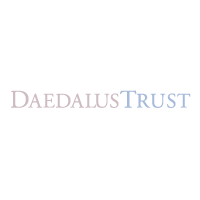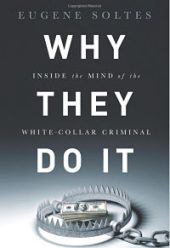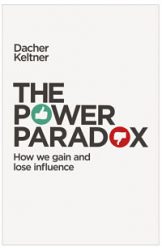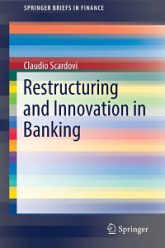Indexes - all Resources
Averting hubris-induced disaster by analysing language: new Daedalus Trust-supported research
Do hubristic CEOs give themselves away in the ways they speak and write? If so, language could provide valuable early warning of potentially destructive leadership. The use of ‘Linguistic Markers’ in identifying CEO hubris is the focus of another Daedalus Trust-supported research project, being conducted by PhD researcher Vita Akstinaite at the UK's Surrey Business School. “In certain circumstances language can work as a DNA sample or...
Written by: Akstinaite, Vita.
Read moreWhy they do it: Inside the mind of the white-collar criminal. (2016)
“…knowing the difference between right and wrong is not sufficient to avoid falling into the behavioral traps people can face when under pressure to succeed.” Eugene Soltes, Harvard Business School professor Pub: PublicAffairs From the publisher’s blurb: Soltes spent seven years (talking to) the men behind the largest corporate crimes in history - from the financial fraudsters of Enron, to the embezzl...
Written by: Soltes, Eugene.
Read moreTrust-supported research explores new hubris dimension – time.
Another research project supported by the Daedalus Trust will provide “fresh insights into hubristic leadership”, according to its recently-released Abstract. “There is little hubris research in business and management which has considered the critical importance and inescapability of time,” observes researcher Tim Wray, a PhD student at Surrey Business School (which is also supporting the project). “Appreciating the role of time ...
Written by: Daedalus admin
Read moreThe line between confidence and hubris. (2016)
Four early signals from a prospective CEO’s behavior help… predict failure or success. Tim Lasseter, advisor at Strategy&, PwC’s strategy consulting business and University of Virginia professor strategy+business, 21 Nov 2016 Illustration: Lars Leetaru "It is rare for a week to pass without a newspaper or magazine offering a tale of the mistaken path of a fallen business exe...
Written by: Lasseter, Tim.
Read more
Leadership and hubris. (2016)
"Zaleznik’s warning (about hubris) resonated in my mind as I learned about James Comey, the head of the FBI, and his October 28 letter to Congress…" Bert A. Spector, Associate Professor, Northeastern University. Fifteeneightyfour, cambridgeblog.org, 5 Nov 2016. "…Harvard psychologist Abraham Zaleznik argues that leaders "develop fresh approaches to long-standing problems and open issues for new options." In their disincl...
Written by: Spector, Bert A.
Read moreCEOs who want to change the world struggle for name recognition. (2016)
"The result may be a comfort to those chief executives who prefer to keep a low profile." Andrew Hill ft.com 18 Jan 2016 “Only four in 10 people can name any chief executive, according to an Edelman poll . "Mark Zuckerberg of Facebook is the world’s best-known chief executive, but his name is recalled by only one in 10 of respondents. "…the fact that public perception of chief executives lags behind reality i...
Written by: Hill, Andrew.
Read moreThe Power Paradox. (2016)
"...compassion and selflessness enable us to have the most influence over others and the result is power as a force for good in the world." Dasher Keltner, professor of psychology and director of the Berkeley Social Interaction Lab, University of California Pub: Penguin Random House “The power paradox is this: we rise in power and make a difference in the world due to what is best about human nature, but we fall from...
Written by: Keltner, Dacher.
Read moreWhy we select toxic leaders. (2016)
Toxic individuals take advantage of the cues we use to identify high potential. David Rock, NeuroLeadership Institute executive director, NeuroLeadership Group CEO Psychology Today, 7 Nov 2016. Extracts: Humans… have significant cognitive resources devoted to identifying and then empowering potential leaders. However, incompetent or even malevolent individuals can take advantage of the cues we use to identif...
Written by: Rock, David.
Read moreThe alchemy of authenticity: Lessons from the 2016 US Presidential campaign. (2016)
Authenticity has been heralded as the ‘it’ factor of the campaign. But, where did the rise of authentic leadership come from? What responsibility does it entail? What is the role of ‘followers’. And, why is authentic style so difficult to develop ? Fiona Kennedy, Darl G. Kolb; University of Auckland, New Zealand Organizational Dynamics (2016) 45, 316—322 From the abstract: “… the 2016 campaign ...
Written by: Kennedy, F. & Kolb, Darl G.
Read moreCreative destruction in the Global Financial System. (2016)
“We are just at the beginning, not the end, of the change journey that started with the global financial crisis of 2008.” Claudio Scardovi, managing director and head of Financial Services for EMEA at Alix Partners: professor at Bocconi University, at SDA Bocconi, and at Imperial College. In: Restructuring and Innovation in Banking, Springer International Publishing, October 2016. In this chapter, Scardovi...
Written by: Scardovi, C.
Read more













